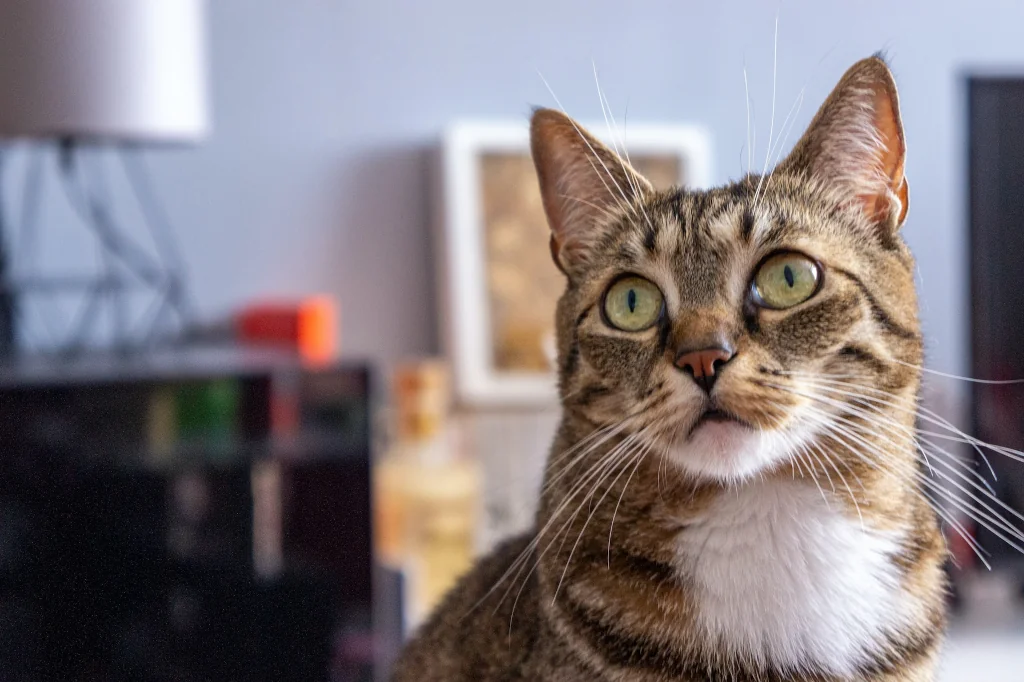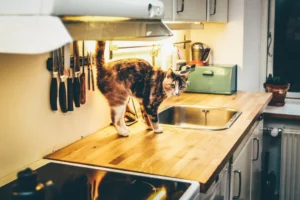If you’ve ever shared a kitchen with a cat, you know the all-too-familiar sight of them hungrily eyeing your chicken dinner. But can our furry friends safely enjoy this household staple?
Now, you might be wondering how to prepare boiled chicken for your cat, how often to feed them chicken, or what alternatives exist. Don’t worry, you’re about to get all the answers.

Understanding Your Cat’s Diet: A Brief Overview
When it comes to the feline diet, it’s crucial to remember that cats are obligate carnivores.
This means they require a diet high in animal-based protein to thrive. Unlike humans or even dogs, cats can’t survive on a plant-based diet. Their bodies are specifically designed to metabolize meat efficiently, and they derive essential nutrients, such as taurine and arachidonic acid, directly from animal tissue.
However, this doesn’t mean you should start serving your cat a plate of meat and call it a day.
A balanced diet for a cat encompasses a variety of nutrients, including vitamins and minerals, as well as certain fatty acids that might not be adequately supplied by meat alone.
That’s why commercial cat foods often have a carefully formulated blend of animal-based proteins, fats, and other necessary nutrients.
Can Cats Safely Eat Chicken? (boiled and otherwise)
Yes, cats can safely eat chicken (no bones), and it’s not just limited to the boiled variant.
Whether it’s boiled, steamed, or baked, chicken can be a great addition to your cat’s diet. It’s packed with protein, and it’s a natural source of taurine, an essential amino acid that cats need for heart health, digestion, and vision.
However, it’s important to note that while chicken is safe for cats, it must be prepared correctly. Always ensure the chicken is thoroughly cooked to eliminate any potential bacteria, such as Salmonella, and remove all bones as they are a choking hazard.
Furthermore, avoid using any seasoning, as common ingredients like onion, garlic, and certain spices can be toxic to cats.
The benefits of chicken extend beyond its nutritional value. For finicky eaters, the smell and taste of chicken can stimulate appetite. And for cats with dental issues or older cats who find dry food hard to chew, soft, tender chicken can be a pleasing alternative.

Preparing Boiled Chicken for Your Cat: Do’s and Don’ts
Preparing boiled chicken for your cat isn’t a complex process, but there are certain rules to keep in mind to ensure your furry friend’s health and safety.
Do’s:
- Thoroughly Cook the Chicken. Always make sure the chicken is fully cooked. Raw or undercooked chicken can contain harmful bacteria such as Salmonella or Campylobacter.
- Remove Bones. Small bones or bone fragments can present a choking hazard or cause internal injury. After cooking the chicken, carefully remove all bones.
- Keep it Plain. Cats can’t process certain seasonings, and ingredients like onions, garlic, and too much salt can be harmful to them. Cook the chicken in water without adding any spices, herbs, or salt.
Don’ts:
- Don’t Use Oil or Butter. Cats don’t need added fats in their diet, and too much fat can lead to digestive issues and obesity.
- Don’t Offer Chicken Skin. Although they might love it, chicken skin is high in fat and not suitable for cats, especially if they’re overweight.
- Don’t Replace All Meals With Chicken. Boiled chicken is a great treat or supplement, but it should not replace a balanced, complete cat food diet, as it does not provide all the nutrients that cats require.
How Often and How Much Chicken to Feed Your Cat
When it comes to the frequency and quantity of chicken to feed your cat, moderation is key.
While boiled chicken can be a great source of protein, it should not be the only component of your cat’s diet.
Think of boiled chicken as a supplement to your cat’s regular diet or a high-value treat. An appropriate serving size could be a couple of small, bite-sized pieces given a few times a week.
This amount can vary depending on your cat’s size, age, activity level, and overall health, so it’s always a good idea to consult your vet for personalized advice.
Remember, the goal is to enhance your cat’s diet, not to replace the balanced nutrition they get from their regular cat food. After all, diversity in a diet isn’t just enjoyable for your kitty—it’s necessary for their overall health and wellbeing.
Alternatives to Chicken in Your Cat’s Diet
While boiled chicken can be a great addition to your cat’s diet, variety is key to ensure they receive a full spectrum of nutrients.
Other meat options include turkey, fish such as salmon or tuna, and even rabbit, all of which should be cooked and unseasoned, just like the chicken.
However, it’s not just about meat. Cats also need taurine, an essential amino acid that is crucial for their heart health, eyesight, and overall wellbeing. Commercial cat food is often fortified with taurine, but if you’re offering a lot of homemade food, consider a taurine supplement, always after consulting with your vet.
One day, Smokey, my male cat, turned his nose up at the chicken I had lovingly prepared. Concerned, I cooked a small portion of rabbit meat, and he devoured it with gusto. That day, I learned that even cats can appreciate a change on their menu!
FAQs
Can I mix boiled chicken with cat food?
Certainly! Mixing a small amount of boiled chicken with your cat’s regular food can be a great way to add variety to their diet and encourage picky eaters to consume their meals. Just remember to follow the safety tips from above, such as removing the bones from the boiled chicken.
How often can I give my cat boiled chicken?
Consider boiled chicken as a supplement or treat, given a few times a week. Always ensure that the majority of their diet consists of balanced, complete cat food.
Can I feed my kitten boiled chicken too?
Yes, kittens can eat boiled chicken (without bones), but it should not be the main part of their diet. Kittens require specific nutrients for their growth and development, usually provided by specially formulated kitten food.
Alex, a passionate animal lover, has experience in training and understanding animal behavior. As a proud pet parent to two dogs and three cats, he founded AnimalReport.net to share insights from animal experts and expand his knowledge of the animal kingdom.








